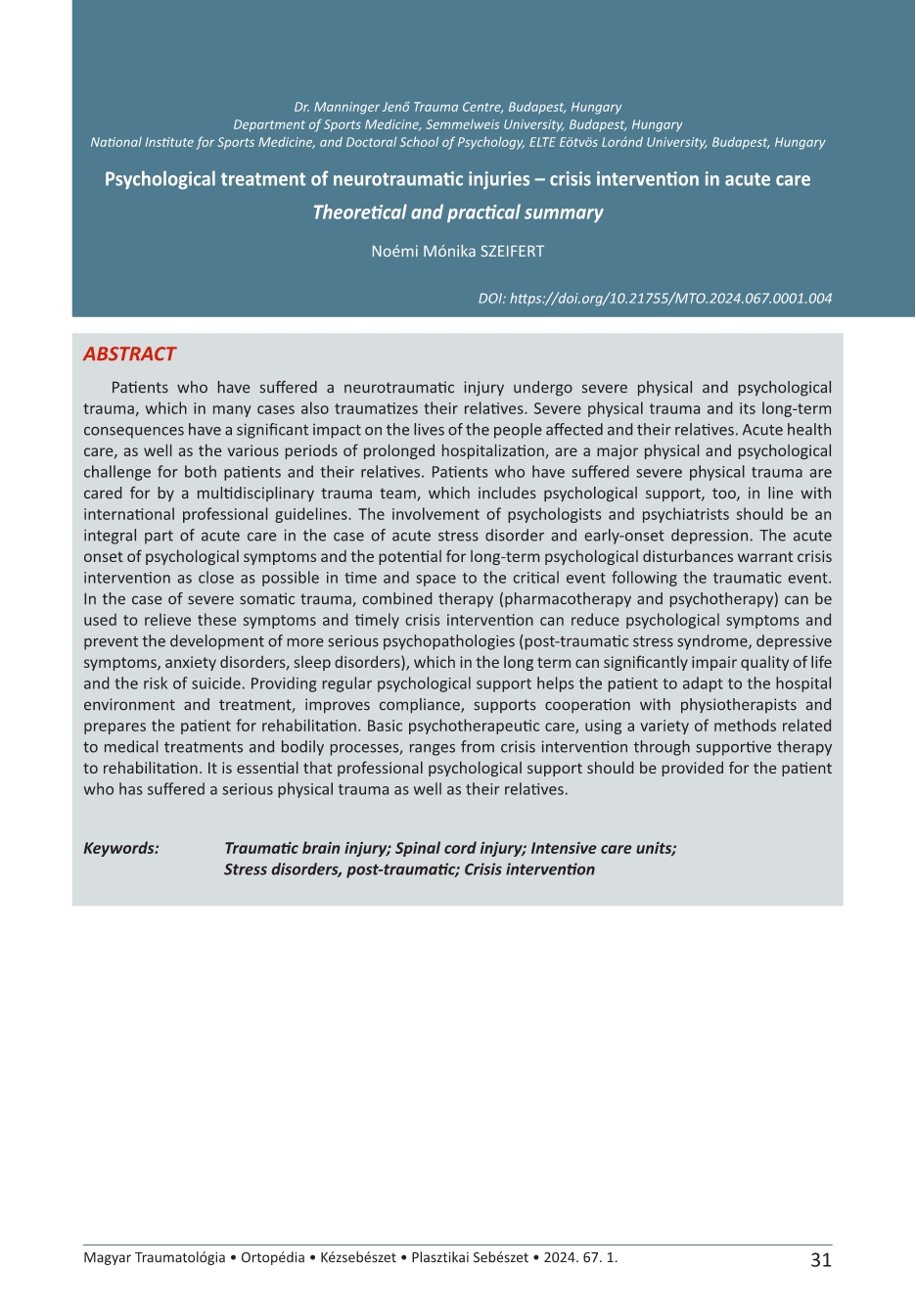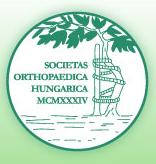Psychological treatment of neurotraumatic injuries – crisis intervention in acute care
Theoretical and practical summary
Absztrakt
Patients who have suffered a neurotraumatic injury undergo severe physical and psychological trauma, which in many cases also traumatizes their relatives. Severe physical trauma and its long-term consequences have a significant impact on the lives of the people affected and their relatives. Acute health care, as well as the various periods of prolonged hospitalization, are a major physical and psychological challenge for both patients and their relatives. Patients who have suffered severe physical trauma are cared for by a multidisciplinary trauma team, which includes psychological support, too, in line with international professional guidelines. The involvement of psychologists and psychiatrists should be an integral part of acute care in the case of acute stress disorder and early-onset depression. The acute onset of psychological symptoms and the potential for long-term psychological disturbances warrant crisis intervention as close as possible in time and space to the critical event following the traumatic event. In the case of severe somatic trauma, combined therapy (pharmacotherapy and psychotherapy) can be used to relieve these symptoms and timely crisis intervention can reduce psychological symptoms and prevent the development of more serious psychopathologies (post-traumatic stress syndrome, depressive symptoms, anxiety disorders, sleep disorders), which in the long term can significantly impair quality of life and the risk of suicide. Providing regular psychological support helps the patient to adapt to the hospital environment and treatment, improves compliance, supports cooperation with physiotherapists and prepares the patient for rehabilitation. Basic psychotherapeutic care, using a variety of methods related to medical treatments and bodily processes, ranges from crisis intervention through supportive therapy to rehabilitation. It is essential that professional psychological support should be provided for the patient who has suffered a serious physical trauma as well as their relatives.
Hivatkozások
Amsten AF. Stress signaling pathways that impair preffrontal cortex structure and function. Nat. Rev. Neurosci. 2009. 10. (6): 410-422. https://doi.org/10.1038/nrn2648
Cheek D. B.: Communication with the critically ill. Am. J. Clin. Hypn. 1969. 12. (2): 75-85. https://doi.org/10.1080/00029157.1969.10734309
Compean, E., Hammer, M. (2019): Posttraumatic stress disorder with secondary psychotic features (PTSD-SP): Diagnostic and treatment challenges. Progress in Neuropsychopharmacol. Biol Psychiatry. 2019. 10. (88): 265-275. https://doi.org/10.1016/j.pnpbp.2018.08.001
Csürke J., Vörös V., Osváth P., Árkovits A. (Ed.): [Our everyday crises. Textbook of psychological crisis and crisis intervention.]. Budapest, Oriold & Co. 2014. Hungarian
Dénes Z, Masát O: [Rehabilitation results after severe traumatic brain injury] Ideggyógyászati Szemle / Clinical Neuroscience, 2022. 75(1-2): 31-37. Hungarian https://doi.org/10.18071/isz.75.0031
Dénes Z., Frey E.: [Care of patients with severe brain injury]. In: Klauber A. (Ed.): [Nursing in rehabilitation]. Budapest. Medicina Kiadó. 2017. 61-62. p. Hungarian
Dr. Manninger Jenő Trauma Center, Budapest, Department of Anesthesiology and Intensive Care. Retrieved from http://www.baleseti.hu/aneszteziologia.php
Egészségügyi szakmai irányelv - Az onkopszichológiai ellátásról. Health professional guideline - About oncopsychological care. [Published] Ministry of Human Resources Health Professional College. 2021. 5. p. Hungarian
Egészségügyi szakmai irányelv - Az onkopszichológiai ellátásról. Health professional guideline - About oncopsychological care. [Published] Ministry of Human Resources Health Professional College. 2021. 7. p. Hungarian
Fejes A.: [Professional protocol of psychologist activities in the rehabilitation of spinal cord injured persons.] In: Ministry of Human Resources, College of Health Professionals. Professional protocol of psychotherapy methods. 2005. 225. p. Hungarian
Hajdu J.: [Mental care in the land of polar bears. Pulmonological rehabilitation]. In: Mészáros G., Kovács P. (Eds.): [Specialized areas of rehabilitation psychology]. Budapest. Aura. 2022. 171-174. p. Hungarian
Hajduska M.: [The crisis of serious illness In: Crisis psychology]. Budapest. ELTE Eötvös Publ. 153-163. p. Hungarian
Herman J.: [Trauma and healing. The impact of violence from domestic abuse to political terror]. Budapest. Háttér. 2011. Hungarian
Klauber A., Havlikné G. I., Mészáros E., Papp M.: [Rehabilitation of spinal cord injuries]. In: Klauber A. (Ed.): [Nursing in rehabilitation]. Budapest, Medicina. 2017. 83-130. p. Hungarian
Kopp M., Berghammer R.: [Medical psychology]. Budapest. Medicina. 2009. Hungarian
Korzenszky K.: [The role of positive suggestion and music in our patients under anesthesia]. In: Mészáros G., Kovács P. (Eds.): [Specialized areas of rehabilitation psychology]. Budapest. Aura. 2022. 14-19. p. Hungarian
Nagy A.: [Loss of control. Cardiology rehabilitation]. In: Mészáros G., Kovács P. (Eds.): [Specialized areas of rehabilitation psychology]. Budapest. Aura. 2022. Hungarian
Nagy A.: Possibilities of low-intensity complex psychological support in cardiovascular diseases In: Mészáros G., Kovács P. (Eds.): Specialized areas of rehabilitation psychology. Budapest. Aura. 2022. 71-77. p. Hungarian
Retteghy T.: [General guidelines for intensive care, options for drug therapy]. In: Büki A., Szeifert Gy. (Eds.): [Basic lines of neurotraumatology]. Budapest, Semmelweis. 2014. 232-241. p. Hungarian
Rigó A., Zsigmond O.: [Somatic illness as trauma. In: Kiss E., Sz. Makó H.: Grief, crisis, trauma and the psychology of coping]. Budapest. Pro Pannónia Kiadói Alapítvány. 2015. Hungarian
Saul L. J., Warner S. L.: Mobilizing ego strengths. Int. J. Psychoanal. Psychother. 1975. 4. 358-386.
Schlanger J., Fritúz G., Varga K.: Therapeutic suggestion helps to cut back on drug intake for mechanically ventilated patients in intensive care unit. Interv. Med. Appl. Sci. 2013. 5. (4): 145-152. https://doi.org/10.1556/imas.5.2013.4.1
Sütő J., Klekner Á., Nagy J., Szemán-Nagy A.: [The effect of surgical psychoeducation on the outcome of spinal surgery]. Ideggyógyászati Szemle / Clinical Neuroscience, 2023. 76. (1-2): 46-50. Hungarian https://doi.org/10.18071/isz.76.0046
Szegleti G.: [Accept the unacceptable]. In: Mészáros G., Kovács P. (Eds.): [Specialized areas of rehabilitation psychology]. Budapest. Aura. 2022.
Szeifert N.: [Crisis intervention in special situations, or the role of the clinical psychologist in trauma care. Theoretical summary and case report]. Magyar Traumatológia Ortopédia Kézsebészet Plasztikai Sebészet, 2022. 65. 1-4. 53-60. Hungarian https://doi.org/10.21755/MTO.2022.065.0104.005
Szeifert N.: [Crisis intervention in special situations, or the role of the clinical psychologist in the psychological support of patients treated in the COVID Intensive Care Unit]. Aneszteziológia és Intenzív Terápia, 2022. 52. (2): 3-12. Hungarian
Szilágyi A. K., Diószeghy Cs., Benczúr L., Varga K.: Effectiveness of psychological support based on positive suggestions with the ventilated patient. Eur J Ment Health. 2007. 2. (2): 149-170. https://doi.org/10.1556/EJMH.2.2007.2.2
Varga K., Diószeghy Cs.: [Psychological management of the ventilated patient]. In.: Pénzes I., Lorx A. (Ed.): [Theory and practice of ventilation.] Budapest. Medicina. 2004. 817-824. p. Hungarian
Varga K., Varga Z., Frituz G.: Psychological support based on positive suggestions in the treatment of a critically ill ICU patient a case report. Interv. Med. Appl. Sci. 2013. 5. (4): 153-161. https://doi.org/10.1556/imas.5.2013.4.2
Varga K.: [Beyond words. Communication and suggestion in medical practice.] Budapest. Medicina. 2011. Hungarian.











